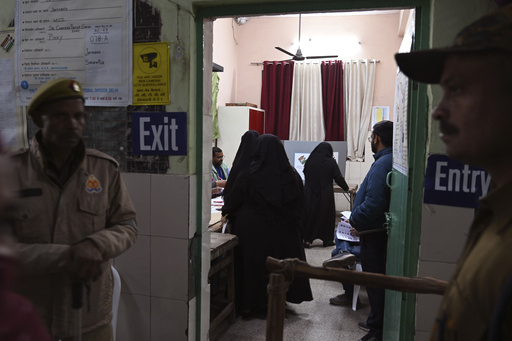NEW DELHI — On Wednesday, Indian Prime Minister Narendra Modi’s Bharatiya Janata Party (BJP) sought to reclaim authority in the federal territory encompassing New Delhi as voters participated in a legislative election.
Despite having not secured a victory in this territory, which houses approximately 20 million individuals in India’s capital, for over 25 years, the BJP is making its bid during these elections.
The BJP is facing competition from the Aam Aadmi Party (AAP), led by Arvind Kejriwal, which has been in control of New Delhi and has garnered considerable support due to its welfare initiatives and commitment to combating corruption.
However, Kejriwal’s reputation as a prominent anti-corruption advocate faced challenges after he, along with other AAP figures, was implicated in bribery allegations.
Election results are slated for release on Saturday, with more than 15 million voters eligible to participate.
Despite failing to achieve an outright majority in the previous year’s national elections, the BJP managed to establish a government in coalition with other parties.
Recently, the party has experienced some recovery by winning state elections in the northern Haryana region and western Maharashtra.
As the election approached, both Modi and Kejriwal proposed plans to enhance government schools, offer free healthcare, provide electricity, and extend a monthly financial aid of over 2,000 rupees (approximately $25) for impoverished women.
The BJP hopes to capitalize on recent favorable developments, including a federal budget that significantly reduced income taxes for the salaried middle class, a key demographic in their electoral base.
In the previous 2020 state legislature election, the AAP achieved a notable victory, securing 62 out of 70 seats, while the BJP managed to win only eight seats and the Congress party failed to obtain any.
The Congress party had ousted the BJP from power in 1998, after which it governed for 15 years.
Political analyst Neerja Chowdhury remarked that the ongoing corruption case has negatively impacted Kejriwal’s public image.
Last year, Kejriwal and two prominent party leaders were arrested for allegedly accepting bribes from a liquor distributor. They denied these charges, claiming they are victims of a political conspiracy.
Subsequently, the Supreme Court permitted their release on bail, and Kejriwal stepped down from his position as chief minister, passing the leadership to a more senior party associate.
Opposition parties have vocally criticized Kejriwal’s arrest, accusing Modi’s administration of exploiting federal investigative agencies to intimidate and weaken political rivals.
They highlighted numerous raids, arrests, and corruption probes targeting significant opposition figures leading up to the national election.
Kejriwal founded the AAP in 2012, harnessing public outrage over corruption scandals. His administration’s pro-poor approach has emphasized improvements in state schools and the provision of affordable electricity, free healthcare, and transportation for women.
Copyright @2024 | USLive | Terms of Service | Privacy Policy | CA Notice of Collection | [privacy-do-not-sell-link]



